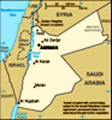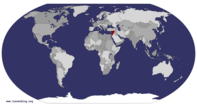Advertisement
Published: October 10th 2007
I am sending this out a bit early because I am about to go on my Eid break at the end of Ramadan and do some great traveling. I have about 7 days off so I am hopefully going to spend some time in Damascus and then either travel around the region there or come back and visit Petra and maybe Wadi Rum.
This is going to be the special Islam edition of my blog entries, if you have no interest in Islam, sacred sites, or think "those people are devil worshipers!" (high pitched old lady voice) then this entry is not for you. This past Monday (one of my days off), I was able to go on a trip with other Qasid students to visit three shrines of fairly well known members of religious history. The trip was comprised of a majority of Muslim students both male and female and about 4 of us who were Christian (you might remember I have taken on this religious identity to avoid explaining my agnosticism in Arabic). Because of the make up of the group, it was basically a day of Islamic education for me both from the sites we visited and

 Peaceful Garden
Peaceful Garden
This is where I was able to relax when the rest of the group was praying at the Mosque at the tomb of Abu Abayda.from the students themselves.
Just as a preface, there are many shrines and tombs in the area not only because it is the main location where many religious events take place, but also because of the Muslim's respect for the dead. In Islam, people visit the graves and the tombs of the dead not to mourn for them, but as a reminder of the glorious life that they lived and to one's own mortality. It is believed that although your existence continues after you die, you can only do good or bad acts while you are alive to determine where you soul ends up after you pass away. What is also added to the ultimate scale of your actions is what you create that outlives you. For instance, if you teach your children to be good and upstanding people then their good actions are also added to the scale of your good acts. Or if you found a orphanage and it continues to help people after you are dead, then that is also considered in the ultimate judgment. So when these saints or prophets inspire people to great deeds and those people thank and pray to the saint then

 Shuaeb's Tomb
Shuaeb's Tomb
He was an awfully tall man.he/she is credited some of their actions. Sorry to use the metaphor of a scale but it made it easy for me to understand. Therefore visiting the graves of these great and righteous men reminds us that we have only this life to perform moral actions, and this one short chance only. In addition, it is believed that when you pray to those saints or Prophets that you visit, God (Allah is Arabic, it's all the same God just different names) puts the soul back into the body of the person so that they can hear your prayers. Often when praying to one of the people that you visit, you don't just go straight to them and ask for the new car you have been wanting, but begin with general prayer for the person in the tomb, then for all of mankind and slowly work your way back to asking a little something for yourself.
The first shrine that we went to was fairly small compared to the other ones and was out in the middle of nowhere. Apparently this happens quite often because outstanding men, especially prophets, are buried where they die. The first man (I have unfortunately forgotten his name) was a very moral person and one of the men who was around in the time of the Prophet and was a general in his army. He was also rumored to love battle and in one myth was put into a catapult and shot into a fortress (that would scare me seeing a man flying through the air waving a sword and coming right over my great wall I am so proud of). This was a nice spot and the tomb itself was made of unadorned stone which made me think that we are the sum of our thoughts and actions, when we die our body moves on but what remains is what we have accomplished and especially the impressions that you have made on people. Even though his tomb was blank, everyone revered the spot where he was buried and continued to honor his actions.
The second shrine was much larger because the man inside it held a much more prominent place in Islamic History. His name was Abu Abayda and he was the third person to convert to Islam. Because I was with a group of very knowledgeable Muslims, I was privileged to hear some of the stories about his life a few of which I think are important to tell. The first was that Abu Abayda was a close friend of the Prophet and a loyal follower his entire life. Because of the pains that the first believes of a faith must go through, he was subjected to some very trying times before Islam took root. In the battle of Badr (super famous, you can look it up) the people of Mecca who opposed the early Muslims attacked them at the city of Medina. During this fight many of the Muslims were forced to fight their close relatives and in the case of Abu Abayda, his father. Throughout the battle, every time Abu Abayda saw his father he would walk away to avoid fighting him until his father finally cornered him and Abu Abayda was forced to kill him. This illustrates the struggle and hardship that the people went through for the sake of their faith. In other battle, the Prophet was wounded when his helmet was dented into the side of his face and Abu Abayda used his teeth to pull the helmet from the side of the Prophet's face, in the process loosing all of his own teeth. I tell you this story not just because it shows his dedication, but also because Muslims revere the Prophet so much that those who touched him, or were even privileged enough to see him are accorded a special place in history. And this is really just one example that illustrates the love that Muslims feel for the Prophet. That was the reason why those cartoons caused so many riots and anger. It was not just because you are not allowed to depict the Prophet in a pictures but because it was an insult to the man that is held so dear by every devout Muslim. In a speech at a conference following the publishing of the cartoons and ensuing havoc, one professor brought the entire audience to tears describing the love that he held for the Prophet. At one point I believe he said that "If I was asked to give up my mother, my father, my children, all that is dear to me, to prevent one hair to be pulled from the Prophet's head, I wouldn't hesitate". I know this is a long description, but I feel like we don't understand the thoughts of the people over hear who's lives we are affecting and often destroying and because I was able to have this insight, I feel like you should have it as well. Like everything, it is just one side of a complex story but I feel that it is an important side not to be misunderstood.
After we spent the bulk of our time at that shrine we visited Shuaeb who should be best known by the English-speaking, Bible-reading audience as I think Jericho the father-in-law of Moses. He took Moses in after he accidentally killed a man in I think Egypt and had to flee. I might be wrong here, especially about the name and someone can post a correction, but I think that is what I heard. His tomb was especially long because he was rumored to be so tall. On the way there, I got into a pretty deep theological discussion with the Muslims on the bus which I am really happy to have had because everyone was very open-minded and their views were enlightening and gave me hope. At the end of the discussion one of the people who I had been speaking with came up to me and said "You don't have to answer this question, but I would like to ask it anyway. For us, Islam is a great banquet and I would like to be the first person to invite you to come and sit at the table." It was not done in any forceful way and he was really understanding when I politely declined but I was not expecting that at all. I was really interested in the discussion, so I guess that he thought I might be looking for a faith. As it stands now, I will keep searching under the label of agnostic learning from everywhere and incorporating great thoughts as I go. On this line I am going to attend some of the lectures of a world famous Sufi Sheikh here in Amman so I will let you know how those go. Thank you for letting me share if you got this far, I hope that you learned something and enjoy the pictures once again posted at http://picasaweb.google.com/luke.bolton514/WalkingOnSacredGround
Ma Salama
Luqa, Luke, Al-Sarih (the one who roams free)
Advertisement
Tot: 0.109s; Tpl: 0.013s; cc: 6; qc: 45; dbt: 0.0723s; 1; m:domysql w:travelblog (10.17.0.13); sld: 1;
; mem: 1.1mb








